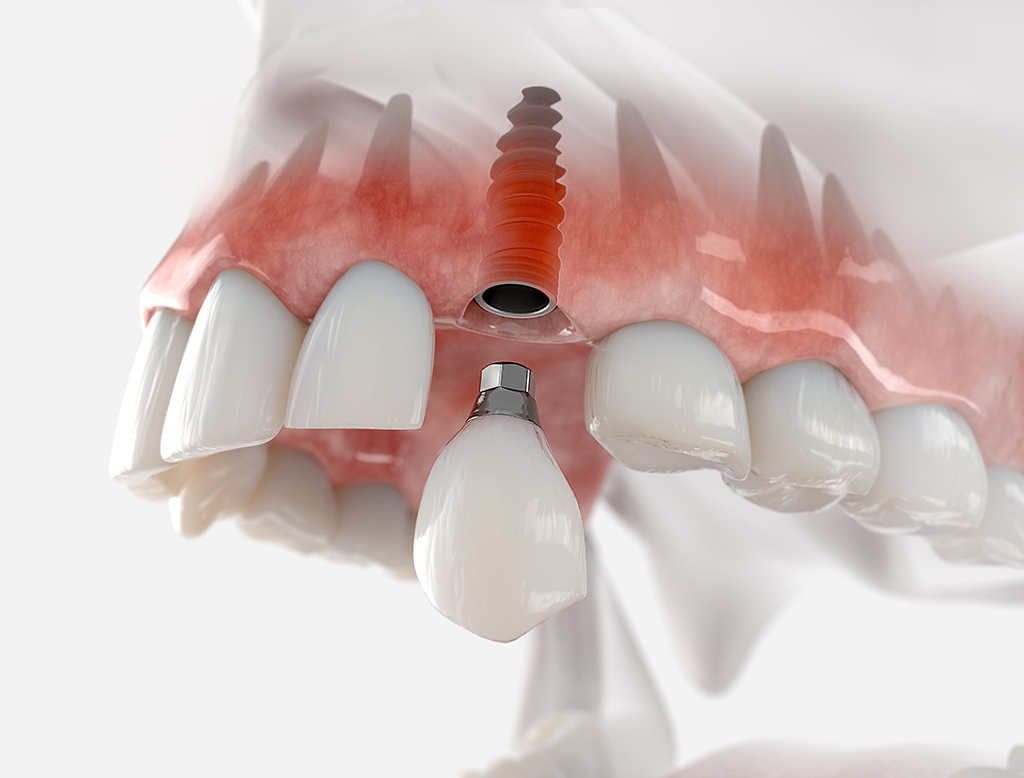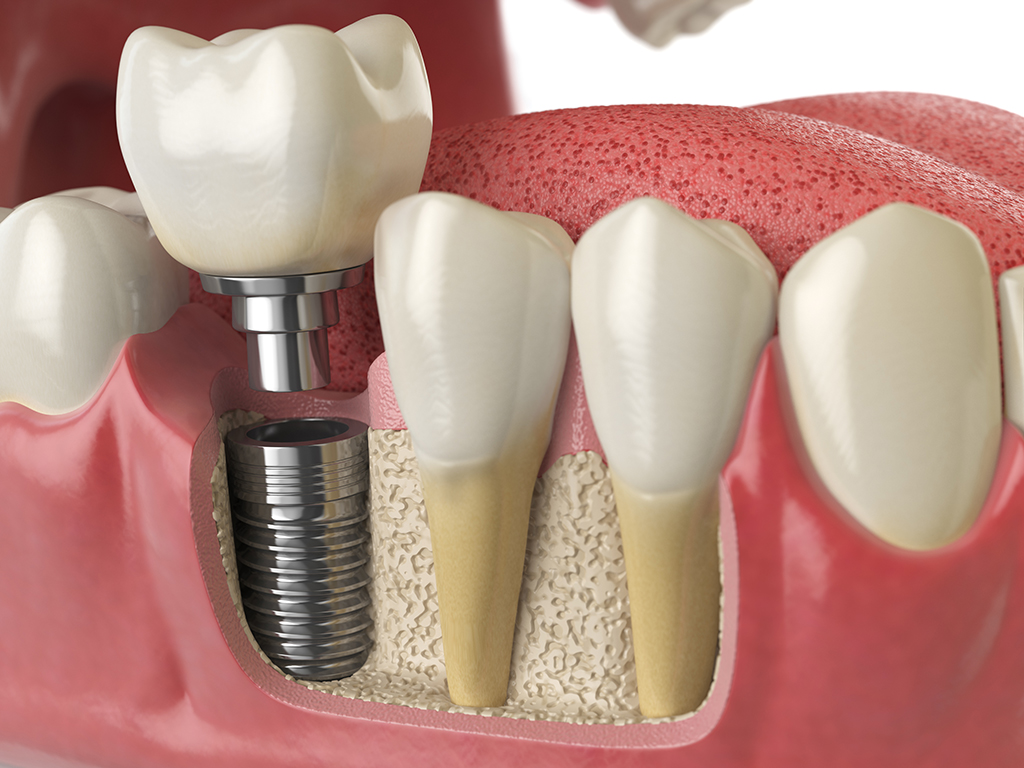What is a dental implant?
A dental implant is an artificial tooth root, typically made of titanium, that is surgically placed into the jawbone to support a replacement tooth or bridge. This implant serves as a stable foundation for various dental restorations, including crowns, bridges, and dentures. The key components of a dental implant include the implant post, which is a titanium screw embedded into the jawbone. Over time, this post integrates with the bone through a process known as osseointegration, creating a secure anchor. Attached to the implant post is the abutment, a small connector piece that supports the final restoration. The visible part, such as a crown, bridge, or denture, is placed on top of the abutment and functions as the replacement tooth or teeth.


The benefits of dental implants are numerous. They provide stability and functionality, allowing patients to chew, speak, and smile naturally. Implants also stimulate the jawbone, helping to prevent bone loss that can occur after a tooth is lost. With proper care, dental implants can last a lifetime, making them a durable and long-term solution. Additionally, implants closely resemble natural teeth in appearance and feel, enhancing a person’s confidence. Unlike traditional bridges, which rely on neighbouring teeth for support, implants preserve the health of surrounding teeth. As a result, dental implants are a popular and highly effective option for replacing missing teeth, suitable for single tooth replacement, multiple teeth, or full arch restorations like implant-supported dentures and full arch rehabilitations.
Advantages
Dental implants offer numerous advantages over other tooth replacement options. Here are some key benefits:
| Durability: Dental implants are designed to be a long-lasting solution, often lasting a lifetime with proper care. The materials used, such as titanium, are biocompatible and resistant to decay. |
| Natural Appearance: Implants closely resemble natural teeth in both function and appearance, helping to restore a patient’s smile and confidence. Custom crowns can be made to match the colour and shape of existing teeth. |
| Improved Functionality: Unlike traditional dentures, which can slip or shift, dental implants provide a stable base that allows for normal chewing, speaking, and smiling. Patients can enjoy a wider variety of foods without discomfort. |
| Bone Preservation: Implants stimulate the jawbone, preventing the bone loss that often occurs after tooth loss. This helps maintain facial structure and can prevent the sunken appearance that can result from bone deterioration. |
| Enhanced Oral Health: Dental implants do not rely on neighbouring teeth for support, unlike bridges. This helps preserve the integrity of surrounding teeth and promotes better overall oral health. |
| No Special Maintenance: While traditional dentures require specific cleaning methods and adhesives, dental implants can be cared for like natural teeth, with regular brushing, flossing, and routine dental check-ups. |
| Increased Comfort: Implants eliminate the discomfort associated with removable dentures, such as sore spots and irritation. Once healed, they feel like a natural part of the mouth. |
| Improved Quality of Life: The confidence and comfort provided by dental implants can significantly enhance a person’s quality of life. Many patients report improved self-esteem and social interactions after receiving implants. |
| Convenience: Unlike dentures that need to be removed for cleaning, dental implants are permanently placed and do not require special cleaning routines, making them a convenient option for daily life. |
Disadvantages
While dental implants offer numerous advantages, there are also some potential disadvantages and considerations to keep in mind:
| Cost: Dental implants can be more expensive than other tooth replacement options, such as dentures or bridges. The overall cost may include the implant, abutment, crown, and any necessary surgical procedures, which can add up. |
| Surgical Procedure: The placement of dental implants requires minor surgery, which may involve some discomfort and a recovery period. Some patients may be apprehensive about undergoing surgical procedures. |
| Healing Time: After the implant is placed, a healing period of several months is typically necessary for osseointegration (the process of the implant fusing with the jawbone) to occur before the final restoration can be attached. This extended timeline can be a drawback for some patients. |
| Bone Density Requirements: Not all patients have sufficient jawbone density to support an implant. In cases of bone loss, additional procedures like bone grafting may be required, which can increase the treatment time and cost. |
| Potential for Complications: Although dental implant surgery has a high success rate, complications can occur, such as infection, implant failure, or nerve damage. Factors like smoking, poor oral hygiene, and certain medical conditions can increase the risk of complications. |
| Maintenance and Care: While implants don’t require special cleaning routines, they still need regular dental care and maintenance. Patients must commit to good oral hygiene practices to prevent infections around the implant (peri-implantitis). |
| Not Suitable for Everyone: Certain medical conditions, such as uncontrolled diabetes, autoimmune diseases, or extensive bone loss, may affect the suitability for dental implants. A thorough evaluation is necessary to determine candidacy. |
| Changes in Bite: If an implant is not placed properly, or if there are changes in the jawbone or surrounding teeth over time, it may affect the bite or lead to discomfort. Adjustments may be needed to ensure proper alignment. |
